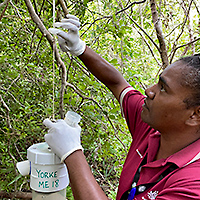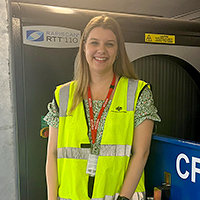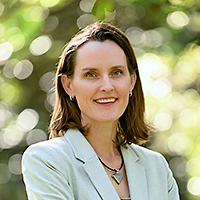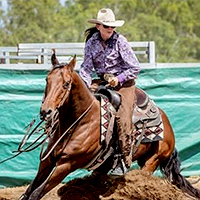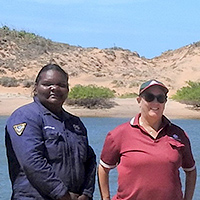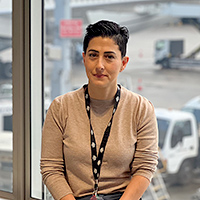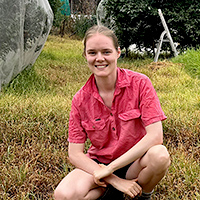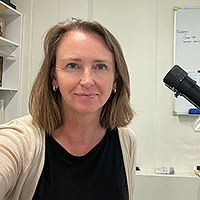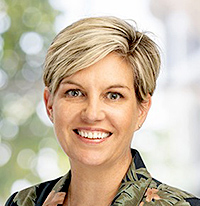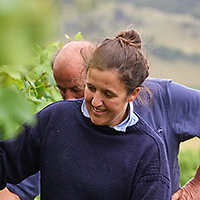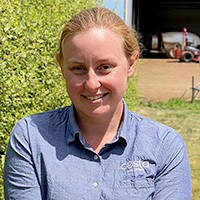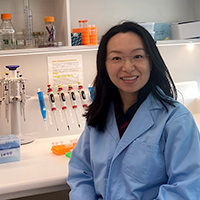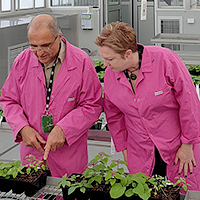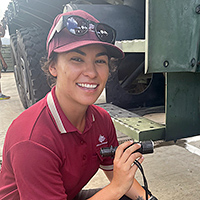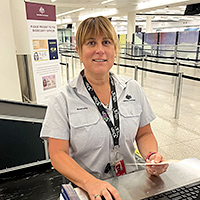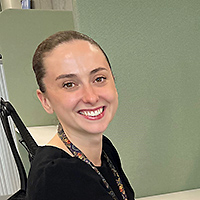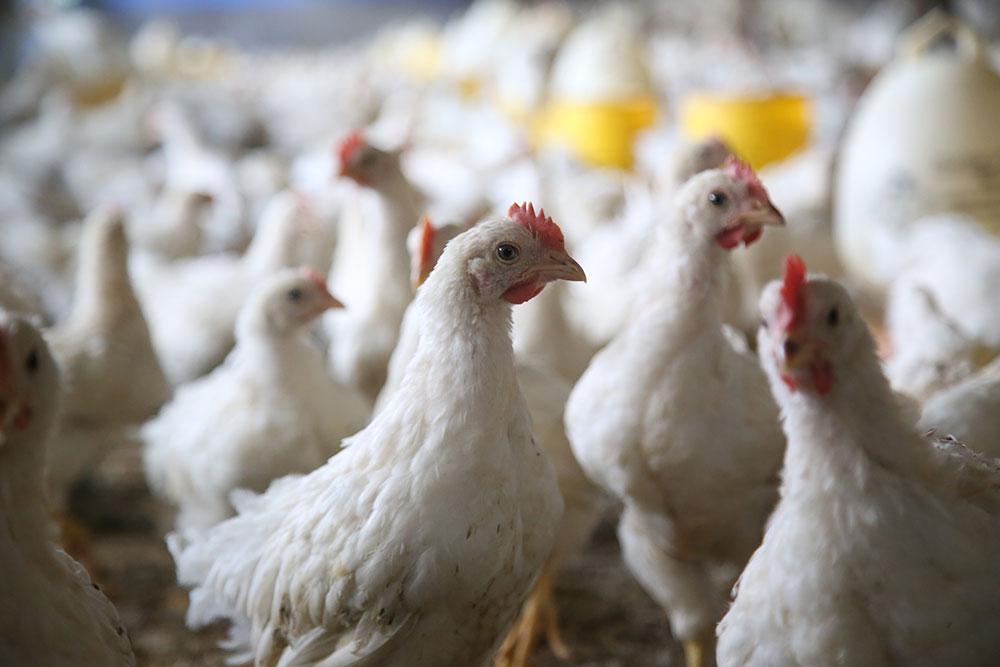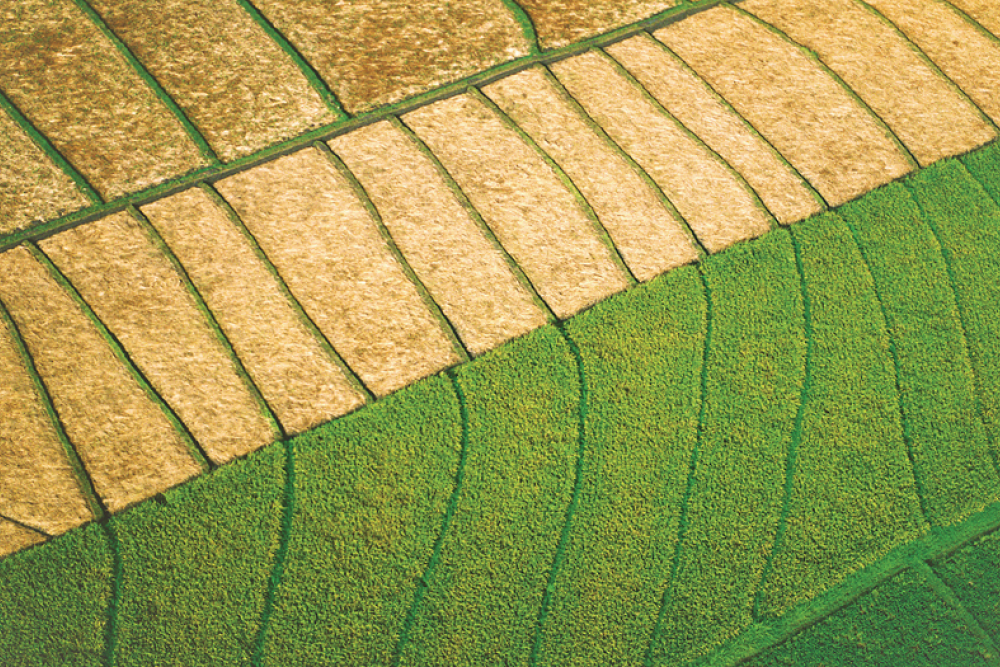On International Women’s Day 2024 we’re inspired by the many women working across Australia’s agricultural industries.
Over 88,000 women work in Australia’s agriculture sector – nearly one third of the agricultural workforce – so we value the inclusion of women in agriculture and those who work across our organisation.
Women make up nearly half of our leadership, including two of our four Deputy Secretaries, as well as in key scientific roles such as Australia’s Chief Veterinary Officer, Dr Beth Cookson.
For today’s celebration we’ve showcased inspiring women working in vastly different roles around Australia.
We spoke to women across the nation, in departmental roles as well as key industry figures. Learn more about each of the women who inspire inclusion and what they had to say about their part in this vast and diverse sector of Australia’s economy.
Queensland
Gikana Mosby, 35, Yorke Island
Gikana is a biosecurity officer in the Torres Strait Islands.
"I know my work is vital, we’re on the front line, if I don’t do my work then pests and diseases could damage the Australian environment, and we’d suffer as well,” Gikana said.
"I think women bring more organisation, multi-tasking and are more prepared. But I’m seeing that more from the men as well, it’s good to have a balance of both.
"I hope to inspire younger ones, I think we need to raise more public awareness of what I do and try and get them being interested and involved in becoming a biosecurity officer."
Jackie Lowe, 27, Brisbane
Jackie Lowe is an assistant director in the Detection Technology section, part of our Cargo and Conveyance Policy and Detection Capability Branch. She brought her knowledge of x-ray technology from previous work in hospitals to the department to help develop x-ray imaging for biosecurity detection.
“I find fulfilment in knowing that my work makes a real difference in society. I understand that my contributions to biosecurity have far-reaching effects on many areas like agriculture, farming, and the environment. Knowing there is this interconnectedness fuels my enthusiasm for working in this dynamic field,” Jackie said.
"I believe diverse perspectives, including those from women, bring valuable insights to the table. With different personalities and approaches, a well-rounded team can approach situations from various angles, leading to more comprehensive solutions.”
Dalene Wray AM, 48, Brisbane
Dalene is the managing director of OBE Organic, an organic beef exporter. She has been with the company for the last 20 years.
“Our supermarkets are stocked with food from all over the world, and so much of the labour that got it there is female. But it’s not only about female farmers – there are women in influential positions in governments around the world. Our diplomats are negotiating with women in leadership positions in agriculture all around the world,” Dalene said.
“We're better off overall with women working in agriculture, whether it's on farms, or our truck drivers, to diplomats negotiating free-trade agreements. We're better off with women in the room.”
Victoria King, Townsville
Victoria is a senior auditor in our Compliance and Enforcement Division, making sure exports of Australian fresh produce meet international market requirements.
“I’ve always had an agricultural connection. I grew up riding horses – I was hellbent on riding. My mother was a ballerina, she was appalled! But it’s either in your blood or it’s not. I ended up doing a degree in Agricultural Science,” Victoria said.
“The job has been fulfilling as I have been able to work across so many different import and export pathways in my career, which I love. You don’t realise the broad scope of the department until you get the opportunity to experience it yourself.”
Northern Territory
Gayle Heron, 60, Darwin
Gayle is a Larrakia woman and a community liaison officer with the Indigenous Ranger Business Management section, within the Northern Australia Quarantine Strategy. She works with many female rangers.
"I can't express how good it makes me feel going out on country and working with the rangers, both the men and women. The rangers are always so helpful, they love being out there and they have a sense of pride in the work they do," Gayle said.
"I feel very strongly about the country and maintaining our international high standards, I would be devastated if something came in that devasted our Aboriginal communities and impacted traditional food sources."
New South Wales
Neshat Ansari, 42, Sydney
Neshat is an assistant director in the Traveller Policy section, part of our Traveller Policy and Operations and Human Health Branch. She has worked for the department for 23 years.
"I will be helping ensure the Western Sydney Airport is set up to meet our requirements in terms of biosecurity," Neshat said.
"I feel very lucky as I've been with the department for 23 years and I've done so many interesting and different roles. I've been given opportunities which has made my career really varied. The department has always been so supportive, and I've been fortunate to have some wonderful mentors and leaders who have helped me take up opportunities."
Sophie Nichols, 26, Singleton
Sophie runs a small regenerative agriculture farm with her mother near Singleton.
“I think it’s important that women are recognised as more than just women on the land, but rather that they’re seen as primary producers. We can work on the farm now with more innovative equipment. We use a lot more data than ever before,” Sophie said.
“Regenerative agriculture is often picked up by women, and I think it suits our strength more than large-scale agriculture. If you have children, or want to work off-farm, then regenerative farming can suit you.”
South Australia
Dr Kate Sparks, 49, Adelaide
Kate is a principal entomologist for our Operational Science and Surveillance Branch. She manages a team of entomologists and is helping introduce new molecular diagnostic techniques to identify pests.
“I really enjoy my job as every case is like a mystery to solve, and the entomologist is a bit like a detective,” Kate said.
“If you are interested in science, my advice is to get your basic skills behind you then take up every opportunity and always look for new opportunities. There are so many different pathways available to scientists.”
Julie Bird, 50, Adelaide
Julie Bird is the Chair of Horticulture Innovation Australia and has spent years working in agribusiness.
“I like a challenge, I like diversity and change, so it's never a static playing field. I feel like the ag sector has no end of challenge and change getting thrown at the operating environment,” Julie said.
“I don’t want to be defined by my gender, and I don’t expect anyone else define me by it, it’s just part of the tapestry or the diversity that everyone brings to the table. I certainly don’t walk into an environment thinking that I am anything other than an equal.”
Tasmania
Anna Cotton, 32, Swansea
Anna is a sixth-generation assistant farm manager for a mixed wine grape and wool farm, and a Nuffield Scholar.
"My advice for women looking to get into agriculture is to go for it, find and utilise some contacts. I’ve only ever been supported and encouraged, and it’s a very different industry from what it was 30-40 years ago. Women have a vital role to play and are really important in the future success of the agriculture workforce,” Anna said.
"I think the most important thing is encouraging the next generation of women to enter the industry, there are so many opportunities and scholarships out there now, and so many people willing to offer support and advice, just please jump at every opportunity, and don’t hesitate to reach out to people."
Kirsty Dickenson, 21, Tasmania
Kirsty is a horticulturalist and Nuffield Scholar.
"For other young women looking to start a career in agriculture, I think I would tell them to get out and have a go, find something you’re engaged in and follow that, find some mentors to help you along the way, and there’s not just one clear path into agriculture,” Kirsty said. "I think the basis is to encourage other women to the industry, it’s just putting your hand up for opportunity, trying new things and eventually you’ll find what you like and where you fit.”
Victoria
Grace Sun, 40, Melbourne
Grace is a molecular biologist working in the Modern Technology and Diagnostics Tools section, part of our Plant Health Policy Branch. She has assisted the department in adopting new molecular tools as part of our modern diagnostic capability.
"Recently, I have been able to build on my passion for coding. For me, when I read code, it just makes sense and I understand it. It makes me feel amazing. So I've been building those skills and using coding in my data analysis,” Grace said.
"Our science team has a lot of women and they are always so helpful and supportive."
Dr Julie Pattemore, 53, Melbourne
Julie is the director of the Modern Technology and Diagnostics Tools section, part of our Plant Health Policy Branch. She works out of the Post Entry Quarantine facility in Melbourne.
"I am now leading a new program to uplift the diagnostic capability of our eight laboratories across the country and it's a real opportunity for transformation and change," Julie said.
“While my journey has been unconventional, I can honestly say that the sum of my experiences, good and not so good, has given me the confidence and self-belief to lead by example and empower my female cohort to do the same.”
Western Australia
Mundinarra Daley, 25, Port Hedland
Mundinarra is a maritime operations manager in our Cargo and Conveyance Policy and Detection Capability Branch, and part-time army reservist.
"I really like to keep Australia in a safe environment so I really enjoy working on the front lines," Mundinarra said.
"My advice to any women looking to start a career in agriculture is don’t be afraid, especially within inspections, you think straight away that it’s a male-dominated position but don’t be afraid, females are really coming up in the department so just go for it."
Justine Gribbin, 50, Perth
Justine is a team leader in our Biosecurity Air and Sea Traveller Operations at Perth International Airport. She has worked in our department for nearly 20 years.
"I love being out on the floor with my team and being a friendly, welcoming face as people come off the plane," Justine said.
"We get to meet people from all over the world and learn about different cultures and customs but, also, we play a vital role in stopping exotic pests and diseases entering Australia, some of which could have massive economic impacts if introduced into the country.”
Australian Capital Territory
Caitlin Flux, 29, Canberra
Caitlin is an assistant director with the Biological, Laboratory and Human Tissues team, part of our Animal and Biological Imports Branch. She has worked for the department for 3 years.
“Being in a science-based role I’m constantly learning new things. I really get to make the most of my studies and background, and I’m supported to continually build on that through professional development,” Caitlin said.
"Having women employed in agriculture allows us to harness diversity that would otherwise be lost. In my team we have women with backgrounds in anything from academia to animal handling to human pathology. If we didn't encourage and support women in agriculture we wouldn't have all that valuable expertise and perspective."
Read about Australia’s Chief Veterinary Officer, Dr Beth Cookson, in our media release.

